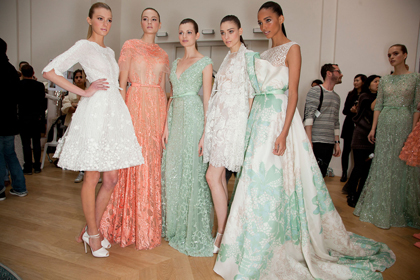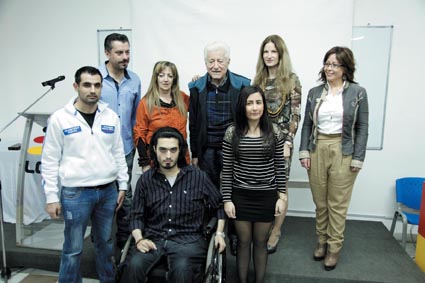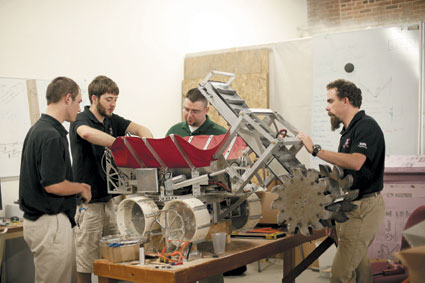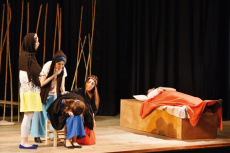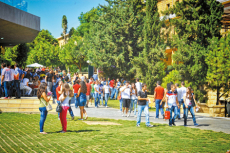Fashion Design Program - courses-LAU
Curriculum and Course Description
The curriculum of the Bachelor of Science in Fashion Design is composed of the common Foundation Year [Part A], the Core Curriculum [Part B], in addition to Liberal Arts requirements. The total number of credits required for the Bachelor of Science in Fashion Design is 130 credits.
A. Foundation Year
The Foundation Year program is a one year program common to students in all design majors: Architecture, Graphic Design, Interior Design and Fashion Design. After completing this first year, students proceed to continue in the major of their choice. The following courses constitute the core requirements of the Foundation year:
FND 231 Design Studio I-A
3 Credits [2-2]- No prerequisites- passing grade: C
This studio introduces visual perception as a primary design tool through an initiation into different modes of representation and formal analysis of the elements of visual language [line, shape, volume, texture, color], as well as the study of the effects of various factors such as light and depth on forms. Exercises in this module are intended to develop the students’ perception of form, to coordinate between the eye and the hand in the process of representation, as well as to develop the analytical and critical interpretation of visual phenomena.
FND 232- Design Studio I-B
3 Credits [2-2]- No prerequisites- passing grade: C
This studio is directed towards the teaching of the basics of plastic modeling and the introduction of analytical thinking through exercises that evolve from 2d drawings to 3d modeling. Following a concerted methodological approach, different visual and analytical tools will be explored with considerable emphasis placed on learning through making. Exercises in this studio will also stress on the importance of craftsmanship and will train students in the different techniques of modeling requiring an active use of the workshop. A shop orientation session is required at the beginning of this course to introduce students to the basic tools and safety procedures for using the workshop.
FND 233- Design Studio II-A
3 Credits [2-2]- prerequisite: FND 231 - co-requisite: FND 251- passing grade: C
This studio further develops studies of visual perception in the two-dimensional field through elaborate explorations that involve critical thinking and the creative representation of themes and ideas into forms, using both traditional and digital media. The main focus of the studio is to develop the student’s visual rendition and interpretation of visual phenomena, incorporating process as a necessary mode in the development of design projects. The studio will explore different image-making techniques emphasizing composition, layout and presentation as a means of conceptual expression and communication in design, stressing also on research and verbal presentation as means for the critical elaboration of ideas.
FND 234- Design Studio II-B
3 Credits [2-2] - prerequisite: FND 232 - passing grade: C
This studio further explores three-dimensional plastic modeling as a means for formal interpretation through studies that involve structural analysis, dissection, assembly, and transformation, with the objective of developing elaborate apparatus rather than sculptural forms. Exercises in this studio are open to experimentation and innovation and will stress plastic modeling in various materials, and the active use of the workshop. The studio will continue to stress on ‘process’ as a necessary mode for the refinement and elaboration of design projects, and for the development of the students’ artistic, analytical and interpretative faculties.
FND 240 Sketching
2 Credits [1-2] Prerequisites: None. Passing Grade: D
This course introduces freehand sketching as a conceptual tool for designers, emphasizing observation and coordination between the eye and the hand, and initiating students into various freehand drawing techniques with pencil and markers, with the objective of developing the necessary skills for the quick representation of landscapes, figures and objects.
FND 241- Technical Graphics
2 Credits [1-2] Prerequisites: None. Passing Grade: D
This course is an introduction to the basics of technical drawing and the representation of various objects as well as platonic forms in two-dimensional format. The course will cover orthographic projection, axonometric drawing, and the basics of rendering in pencil and ink using different techniques.
FND 251- Intro to Computer Graphics
3 Credits [2-2] Prerequisites: None. Passing Grade: D
This course is an introduction to computer graphics, covering the basics of generating and manipulating images using digital media. Exercises involve monochromatic patterns, control and mix of colors, raster and vectorial images, scanning; including exposure to computer platforms and learning of basic computer graphics software programs.
FND 261 Design Culture
2 Credits [2-0] Prerequisites: None. Passing Grade: D
This course is an introduction to the wide discipline of design, and the interrelations between design and art, photography, film, and music. The course will revolve around a series of creative presentations of the multiple dimensions of design, through a series of lectures, movies, art documentaries, and other events that expose the student to the role of design within the contemporary cultural framework.
FND 271 History of Design
2 Credits [2-0] Prerequisites: None. Passing Grade: D
This survey course will highlight the multidisciplinary aspects of design and its evolution in various forms from the nineteenth century to the end of the twentieth century, covering major movements like arts & crafts, art nouveau, de Stijl, Bauhaus and contemporary trends in British, Italian, German, Scandinavian, Japanese as well as other regional trends in design. Lectures will cover the general principles and the ideological premises behind these movements as well as their interrelated manifestations in architecture, furniture, graphics and product design.
B. Fashion Design Core Curriculum
FAS 331 Fashion Design I
5 credits [2-6] - Pre-requisite: FND 233 & FND 234 - Co-requisite: FAS 341 & FAS 351- Passing Grade: C
This studio incorporates design research and concept development in the production of garments and accessories for casual wear. Drawing methods and design techniques are introduced within this studio along with fundamentals of apparel construction. Students are expected to develop a wide knowledge base while working with different classifications of casual wear clothing. The studio will also introduce sketching, flat patternmaking, experimentation with a select range of protein, cellulose and synthetic textiles and materials, in addition to specking and trend reporting in the process of developing a series of casual garments.
FAS 332 Fashion Design II
5 credits [2-6] - Pre-requisite: FAS 331- Co-requisite: FAS 342 & FAS 352- Passing Grade: C
This studio is a twofold design studio that introduces the art of fashion tailoring and knitwear. Tailoring is a craft that requires sensitivity and perfectionism. Knits, on the other hand, are components that complement couture fashion trends. Art, design and craft are brought together in this studio to develop personal concepts and to produce finely tailored garments along with fitting knits. The quality of design and patternmaking are addressed in detail, in addition to understanding the fitting process, selection of textiles and weaves, color scheming, sewing, and selection of accessories. This studio culminates in a fashion show organized at the end of the term.
FAS 341 Construction I
3 credits [2-2] - Pre-requisite: FND 241- Co-requisite: FAS 331 & FAS 351- Passing Grade: C
This studio introduces the hands-on craft and skill of basic patternmaking and the methods of measuring and sizing in translating design concepts into 3D form. Topics covered include: textile technology, layout drafting and cutting, draping using forms to achieve basic garment components- bodices (tops and jackets), dresses, skirts, trousers, seams, lining and hems, lace-up, zippers and buttons, darts and pleats, sleeves and cuffs, collars- as well as hand and machine sewing and finishing. Visits will be made to local factories to observe the commercial process of producing garments on a mass quantity scale.
FAS 342 Construction II
3 credits [2-2] - Pre-requisites: FAS 341- Co-requisite: FAS 332 & FAS 352 - Passing Grade: C
This is an advanced course in the technical construction of garments and accessories. Advanced pattern drafting, sewing techniques, challenging fabric choices that elaborate on knitwear yarns and textures, extensible/stretch fabrics and micro fabrics, hybridization of textiles in structure, texture and connections, knitwear hand and machine techniques (yarn technology, card punching for flat and circular machines), crocheting, embroidery and embellishment of fabrics such as quilting, cartridge pleating and trapunto are all explored in this course, which will give students a thorough knowledge of their craft. The course is also supported by guided tours of couture houses to observe how sophisticated garments are produced.
FAS 351 Digital Studio I
2 credits [1-2] - Pre-requisite: FND 251- Co-requisite: FAS 331 & FAS 341 - Passing Grade: C
This course in an introduction to the digital tools of design and construction of fashion garments using specialized software such as Adobe Illustrator and Adobe Photoshop. The course addresses concept development and concept board preparation and covers the technical aspects of flat pattern drafting with specific computer aided software. Students are expected to prepare basic flat patterns for garment construction, to address sizing and fitting issues, to develop digital studies for print and woven textile finishes and to explore textile repeats, color theory and color scheming and fashion illustration within this course. The final requirement should include the preparation of a complete reference document.
FAS 352 Digital Studio II
2 credits [1-2] - Pre-requisite: FAS 351- Co-requisite: FAS 332 & FAS 342 - Passing Grade: C
This advanced digital studio course further develops the students’ skills in using advanced fashion design software and 3D modeling and animation programs to enhance the representation and visualization of their design concepts, and to realize complete digital patternmaking and catwalk simulations.
FAS 371 History of Fashion I
2 credits [2-0] - Pre-requisite: FND 271- Passing Grade: D
This course is a survey of the development of apparel and accessory design through different periods, with a particular emphasis on the modern period, beginning with industrialization. Social, cultural, economic and industrial factors are discussed along with major art movements that contributed to the development of fashion, and as precursors of contemporary fashion trends.
FAS 372 History of Fashion II
2 credits [2-0] - Pre-requisite: FAS 371- Passing Grade: D
This course explores in detail the contemporary developments in fashion design around the world, with a focus on major names and brands in fashion design. Students are also required in this course to develop their personal research in a selected area of fashion design, and to make presentations on the concepts, techniques, and particularities of their selected research topic.
FAS 431 Fashion Design III
5 credits [2-6] - Pre-requisite: FAS 332- Co-requisite: FAS 441- Passing Grade: C
This advanced design studio builds on proficiencies acquired in the previous year, and incorporates design research to further develop the design and manufacture skills in a garment in either casual wear or haute-couture. Students are here given the option to concentrate on one of these two areas of emphasis: Casual Wear or Haute Couture. The studio requires fluency in concept development using fashion design software, and encourages students to develop their personal design philosophy and to broaden their visual vocabulary in order to propose innovative products for various markets. Final submission requirements in this studio include the development of a finished garment with its shopping report and a trend analysis paper. A juried fashion show is organized at the end of the term to evaluate the students work.
FAS 432 Fashion Design IV
4 credits [2-4] - Pre-requisite: FAS 431- Co-requisite: FAS 482 - Passing Grade: C
This studio is an experimental studio where students are given the opportunity to experiment in the design and production of attires that cross boundaries and re-define contemporary fashion design. Theater and performance costumes may also be used to offer students the opportunity to analyze and interpret fashion in a variety of media including pop culture, film, theater, and performance art. In order to further develop their technical skills in this process of creative design experimentations, students will be supported by professional technicians in the production of their experimental garments.
FAS 441 Fashion Illustration
3 credits [2-2] - Pre-requisite: FND 240 & ART 221- Co-requisite: FAS 341 - Passing Grade: C
This studio introduces the techniques of fashion illustration and hand-rendering of fabrics and finishes in various media. Working from live models, students are encouraged to develop their own personal style of figure illustration. Lectures and demonstrations are used as supplementary material to help students articulate their ideas visually.
FAS 461 Final Project Seminar
2 credits [2-0] - Co-requisite: FAS 431- Passing Grade: C
This course is a seminar that focuses on the discussion of various topics of research, leading to the individual selection of particular topics for the final year project. The course will include a number of lectures, as well as theoretical discussions on issues of relevance to contemporary fashion design, which would serve as a basis in the elaboration of the final project.
FAS 481 Fashion Apprenticeship
2 credits [1-2] - Pre-requisite: FAS 332 - Passing Grade: D
This is an instructor-directed, industry sponsored apprenticeship workshop in which students are asked to broaden their critical skills by deepening their technical knowledge in the production of apparel in one of the following options: Shoe Design, Accessory-Jewelry Design, Millinery Design, Bridal Wear Design, Hair & Make-up Design. This workshop allows students to understand the underlying principles and particular techniques of construction that the production of specialty items requires. A series of focused workshops are offered in this course to initiate students to various construction techniques and methodologies.
FAS 482 Fashion Workshop I
2 credits [1-2] - Co-requisite: FAS 432 - Passing Grade: C
This course presents an opportunity to invite well-known, international designers to give an intensive one or two-week workshop on an area of interest and relevance to contemporary design in this field. Invited tutors would select the theme and project to be developed during this short workshop.
FAS 531 Fashion Design V
4 credits [2-4] - Pre-requisite: FAS 432 - Co-requisite: FAS 582 - Passing Grade: C
This studio explores the fashion apparel and textile industry from an ecological, social, and economic viewpoint, giving students the opportunity to take the issues of environmental sustainability, human rights, and economic sustainability into consideration in the development of their design work. Students are expected to produce creative designs that use lower carbon footprint, and to explore the possibilities of developing nature-friendly, sustainable solutions in fashion design.
FAS 532 Fashion Design VI
4 credits [2-4] Pre-requisite: FAS 531- Passing Grade: C
Emphasis Options: Casual Wear or Haute Couture
This studio is the capstone of the fashion design curriculum. The research developed in the Final Project Seminar is carried through design development and production during this final studio, under the direction of one chosen advisor. Students are evaluated on the design and presentation of their full garment line, along with the submission of an individual portfolio that includes their personal design philosophy. The students’ final project is presented as an individual fashion show, organized by the student at the end of the term, and juried by a group of experts.
FAS 561 Fashion Business
2 credits [2-0] - Pre-requisite: FAS 431 & MKT 201 - Passing Grade: D
This course covers a series of lectures on the various aspects of successfully running a fashion business. Students in this course study fashion marketing, merchandising, retailing, import and export, product development, brand and marketing management, trend spotting, media and public relations. Students are expected to research and assess the production costs and sale power of various fashion products in global trade, with a focus on fashion and trend forecasting, competitive retail analysis and offering successful management solutions.
FAS 581 Internship
2 credit [0-200] Pre-requisite: FAS 432 - Passing Grade: P
The internship requires students to complete a minimum of 200 hours of work at a fashion design house or fashion related industry, in order to supplement their design knowledge with hands-on practical training covering the full process of garment production.
FAS 582 Fashion Workshop II
2 credits [1-2] - Co-requisite: FAS 531- Passing Grade: C
This second workshop is also an opportunity to invite well-known, international designers to give an intensive one or two-week workshop on an area of interest and relevance to contemporary design in this field. Invited tutors would select the theme and project to be developed during this short workshop.
C. Professional Electives- Fashion Design
FAS 421 Lingerie and Swimwear
3 credits [2-2] Pre-requisite: FAS 341- Passing Grade: C
This studio course hones the skills of design in women lingerie, male underwear and swimwear apparel categories examining the fundamental construction methods and industry specific materials related to each specialty. From design research to concept development and fabrication, submissions include a series of projects, each featuring a completed piece in each specialty wear.
FAS 422 Textile Design
3 credits [2-2] Pre-requisite: FAS 341- Passing Grade: C
This twofold studio course combines a comprehensive historical and contemporary survey of woven and knitted fabrics used in apparel with a study of textile science, covering the design and production techniques of protein fibers, cellulose fibers and synthetic fibers and their interaction with finishes such as dyes, pigments, muds and ochre. Students learn to identify fiber and fabric properties and to evaluate their performance. The yarn system, weaving and knitting as well as finishes- printed, painted, felted, dyed or woven patterns are investigated as sources for creative applications in fashion design. Students submit a research paper that analyses the methodology explored and techniques used in their projects, demonstrating the developmental phases of various experimental structural and textural outputs in the design and production of a textile piece.
FAS 423 Leatherwear Design
3 credits [2-2] Pre-requisite: FAS 341- Passing Grade: C
This studio covers the design of leatherwear and plastic materials, and identifies accessory categories incorporating advanced levels of design research [markets, suppliers, construction methods, manufacture] and development of various leather products from concept to execution. Submissions expand from original concept to garment/accessory development, patternmaking and fabrication of the finished apparels.
FAS 424 Sportswear Design
3 credits [2-2] Pre-requisite: FAS 341- Passing Grade: C
This studio covers design and construction of sports apparel by addressing ergonomics/ biophysics as a science concerned with human morphological factors in design. The studio will focus on the study and conception of sports apparel in tune with human anatomy, and will introduce the study of human physiological functions such as thermoregulatory responses, comfort sensation, effects of extreme bodily movements and climate insulation on the design of such apparel. The course will also survey technically-enhanced fabrics used in the production of sportswear. Final requirements of this studio include the design and fabrication of a sports apparel featuring elaborate silhouette study as well as innovative use of performance material to cater for optimal fit, aesthetic need and climate suitability.






